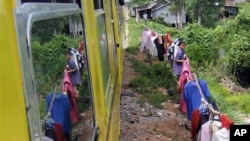Auditors at the Asian Development Bank say the organization should work to compensate some 4,000 families hurt by the construction of a railroad.
The ADB’s Compliance Review Panel said in a report that the $143-million project had not met organization guidelines, leaving a need for a fund to help those adversely affected.
The review panel recommended the ADB “establish a compensation deficit payment scheme; improve facilities at resettlement sites; improve the functioning of the grievance redress mechanism, to be reflected in a time-bound and verifiable action plan; develop an appropriate program to build capacity for resettlement in the Interministerial Resettlement Committee, to be reflected in a time-bound and verifiable action plan; establish a debt workout scheme to help highly indebted families repay their accumulated debts through a dedicated credit line and a debt workout facility; and implement the expanded income restoration program in a sustained and sustainable manner.”
The audit found more effort needed to bring the railway project into “full compliance” with ADB standards.
More than 4,000 families across four provinces and in Phnom Penh are now dealing with the loss of land, housing or businesses, since the government began to fix its railways, in 2006.
Eang Vuthy, executive director of Equitable Cambodia, said families have not been given any solution since 2010, despite living in dire conditions. Some of that has been due to inaction by the ADB, he said. “We want to see the ADB, the government and the people have good cooperation. We want to see a plan that can work and benefit the people. We don’t want to see violations of policies and people’s rights.”
The aim is to help victims of the project like Pol Try, 43, who moved to an area west of Phnom Penh after the project began. Four of his five children are in school, but he said the new place is difficult to live in, because there are few amenities, and no nearby market.
“People here lack many things because they lost their businesses,” he said. “They have a hard time earning a living, because it’s too far away and doesn’t have a market. I abandoned my house to come and live in a rental home near National Road 4, to solve my living conditions.”
Chheng Hak, 36, who lives in Poipet, Bantey Meanchey province, said people displaced by the project have been given little information and few choices. “Some families that were supposed to get land only got $10,” he said. Some officials have sold off land that was supposed to go to the people, he said. His own case is moving through he courts, he said, but he appealed to the ADB to do more.







